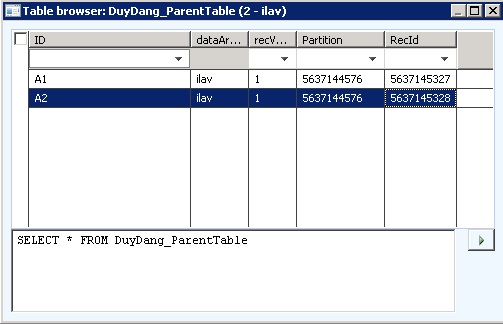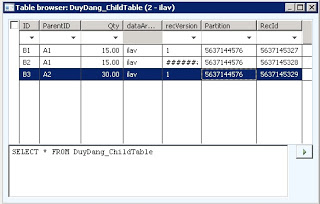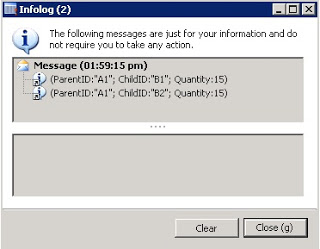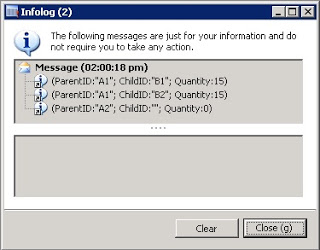Difference between QueryFilter and QueryBuildRrange
In Dynamics AX, we have two way to filter the result set of records in joined query is using QueryFilter class and QueryBuildRange class.
So what's difference between them? when do we use QueryFilter class? When do we use QueryBuildRange class?
Today, i will make a simple sample to show what is difference between them. I have a table DuyDang_ParentTable which have 1 columns ID.

And another table DuyDang_ChildTable which have 3 columns : ID, ParentID, Qty.

With the relation DuyDang_ParentTable.ID = DuyDang_ChildTable.ParentID.
I have the Outer Join query:
Use QueryFilter class:
static void DuyDang_QueryFilter(Args _args)
{
Query query;
QueryBuildDataSource qbds, qbds1;
QueryRun queryRun;
DuyDang_ParentTable parentTable;
DuyDang_ChildTable childTable;
QueryFilter qFilter;
QueryBuildRange qRange;
struct structSet;
structSet = new struct
("str ParentID;"
+ "str ChildID;"
+ "real Quantity"
);
query = new Query();
qbds = query.addDataSource(tableNum(DuyDang_ParentTable));
qbds1 = qbds.addDataSource(tableNum(DuyDang_ChildTable));
qbds1.joinMode(JoinMode::OuterJoin); // Set join type.
qbds1.addLink(fieldNum(DuyDang_ParentTable, ID), fieldNum(DuyDang_ChildTable, ParentID));
qFilter = query.addQueryFilter(qbds1, 'Qty');
qFilter.value(queryValue(15));
queryRun = new QueryRun(query);
while (queryRun.next())
{
parentTable = queryRun.get(tableNum(DuyDang_ParentTable));
childTable = queryRun.get(tableNum(DuyDang_ChildTable));
structSet.value("ParentID", parentTable.ID);
structSet.value("ChildID", childTable.ID);
structSet.value("Quantity", childTable.Qty);
info(structSet.toString());
}
}
The result

Use QueryBuildRange class:
static void DuyDang_QueryFilter(Args _args)
{
Query query;
QueryBuildDataSource qbds, qbds1;
QueryRun queryRun;
DuyDang_ParentTable parentTable;
DuyDang_ChildTable childTable;
QueryFilter qFilter;
QueryBuildRange qRange;
struct structSet;
structSet = new struct
("str ParentID;"
+ "str ChildID;"
+ "real Quantity"
);
query = new Query();
qbds = query.addDataSource(tableNum(DuyDang_ParentTable));
qbds1 = qbds.addDataSource(tableNum(DuyDang_ChildTable));
qbds1.joinMode(JoinMode::OuterJoin); // Set join type.
qbds1.addLink(fieldNum(DuyDang_ParentTable, ID), fieldNum(DuyDang_ChildTable, ParentID));
qRange = qbds1.addRange(fieldNum(DuyDang_ChildTable, Qty));
qRange.value(queryValue(15));
queryRun = new QueryRun(query);
while (queryRun.next())
{
parentTable = queryRun.get(tableNum(DuyDang_ParentTable));
childTable = queryRun.get(tableNum(DuyDang_ChildTable));
structSet.value("ParentID", parentTable.ID);
structSet.value("ChildID", childTable.ID);
structSet.value("Quantity", childTable.Qty);
info(structSet.toString());
}
}
and result info here:

We can see the difference between them
- When you use
QueryFilterclass, the restriction is in theWHEREclause of theOUTER JOINin the ANSI SQL select statement that is generated by the AOS for the underlying database system.
SELECT * FROM DuyDang_ParentTable(DuyDang_ParentTable_1)
OUTER JOIN * FROM DuyDang_ChildTable(DuyDang_ChildTable_1)
ON DuyDang_ParentTable.ID = DuyDang_ChildTable.ParentID
WHERE ((DuyDang_ChildTable(DuyDang_ChildTable_1).Qty = 15))
- When you use
QueryBuidRangeclass, the restriction is in theONclause of theOUTER JOINin the ANSI SQL select statement that is generated by the AOS for the underlying database system.
SELECT * FROM DuyDang_ParentTable(DuyDang_ParentTable_1)
OUTER JOIN * FROM DuyDang_ChildTable(DuyDang_ChildTable_1)
ON DuyDang_ParentTable.ID = DuyDang_ChildTable.ParentID
AND ((Qty = 15))
Thank you for reading!